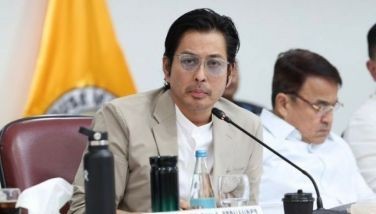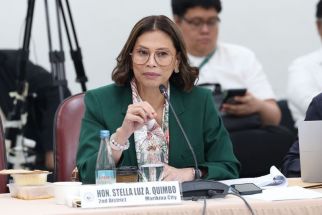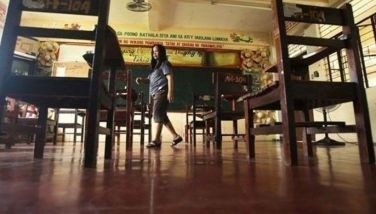Secretary of Finance Juanita D. Amatong: The Fiscal Whip
October 31, 2004 | 12:00am
 ON THE SIXTH FLOOR OF THE DEPARTMENT OF FINANCE, the paneled hallway outside the boardroom is adorned by an array of commissioned oil portraits of former secretaries of finance, beginning with the late Rufino Echanova who sat at the helm of the department in the 1960s to the erudite and legendary Cesar Virata, who has the record as the longest sitting secretary from 1970 to 1986.
ON THE SIXTH FLOOR OF THE DEPARTMENT OF FINANCE, the paneled hallway outside the boardroom is adorned by an array of commissioned oil portraits of former secretaries of finance, beginning with the late Rufino Echanova who sat at the helm of the department in the 1960s to the erudite and legendary Cesar Virata, who has the record as the longest sitting secretary from 1970 to 1986.
The line-up is a story in itself, punctuated by the smiling Jaime Ongpin in happier times before his tragic suicide, all the way to Roberto de Ocampo who was one of the most durable post-Marcos cabinet members, serving for four years during the Ramos administration.
The array is a remarkable list of men who distinguished themselves in various ways, not all of them good. At the center, a spot traditionally reserved for the portrait of the incumbent, is the only woman who has ever sat as head of the finance department in the entire history of the Philippine government: Juanita Dee Amatong.
After the resignation of former secretary Jose Isidro Camacho who had the misfortune of presiding over a record public deficit and equally astronomical public debt, Amatong’s appointment was almost anti-climactic.
"It’s only for three months," Amatong told reporters shortly before the May elections. "Then they will find a replacement and I can go."
At the time, Amatong talked of retirement from government service, just as soon as a permanent replacement was found right after the presidential elections.
Amatong was excited by the prospect of leaving the dof and finally having the time to do the things she wanted to do.
"I want to learn to play the flute!" she announced. In fact, she already bought a flute during one of her trips to the US. But there was no time to learn the instrument and it is still waiting in storage, together with an accordion she had acquired decades before.
"I bought that accordion in Mexico because it looked good. But no one plays the accordion in our house, it’s so heavy," she laughs.
For reporters covering the banking and finance beat, Amatong is a contradiction in terms. She is a no-nonsense bureaucrat who could get things done, but she was a completely untried weapon for the politics that would be required of her as finance secretary. For one, she has a temper that is almost deliberately anti-Zen. She wouldn’t last ten minutes in a Senate budget hearing without snarling at legislators known for their penchant for wasting executive time.
True enough, Amatong’s first foray into a Senate hearing was, for lack of a better work, an experience. Her staff, in shock, had to brief her on the rudiments of appearing before legislators. But Amatong was adamant. She thought out loud and she did not think it necessary to shield anyone from her opinions.
"We are all professionals here and I cannot be led by the nose," she explains.
In one Senate hearing discussing the proposed tax legislations of the Arroyo administration, Amatong was grilled for supposedly failing to submit the proposed legislation to the committee on ways and means.
"What? We gave that to you already! Ask your staff! " she retorted into the microphone, to the utter shock of the senators who were not accustomed to being scolded in public, let alone by a bureaucrat.
That night, she relates, the President called her up.
"She wanted to know if it was true that I was quarreling with the senators," Amatong shares. "I explained that there was a miscommunication. We had submitted everything and the senate staff confirmed that we did. It’s not my fault that they didn’t read the materials."
Days later, committee chairman Senator Ralph Recto called her up and said he had read the proposed bills submitted by the dof.
Everyone who worked close to her at the dof had only one thing to say about the whole incident: "That’s vintage dfa."
Amatong herself analyzes it in retrospect and concludes that it was important for legislators to realize that the dof knew what it was doing.
Thus, Amatong established the reputation that only one other Arroyo cabinet official (budget secretary Emilia Boncodin) has managed to successfully pull off: intimidate her at your peril.
Amatong’s temper is perhaps what explains the bond between her and her boss, also notorious for her explosive temper.
Despite the colonial caricature of the Filipina woman as conservative, subservient and fanatically religious, strong women are not rare in this culture. The Filipino family is publicly patriarchal but functionally matriarchal.
Amatong’s background, however, makes her an even rarer anomaly. Reared in an intensely traditional Chinese-Filipino family, Amatong grew up in the conservative war era and came of age in the convulsion that followed Philippine independence from the US, when educated urban women started smoking, getting jobs and hiring nannies to raise their children.
"I come from a very traditional Chinese family–my father was Chinese and a very traditional Chinese at that," she says.
The Dees owned a small business in Negros Oriental and she was the oldest of seven children. Being female, she was expected to get a commerce degree and man the cash register in the shop. "My brothers were expected to take over the business, I was supposed to help," she says.
When Amatong entered Siliman University in Dumaguete, however, she had other plans. She took up pre-law. "Just to annoy my father," she explains. She shifted to commerce and later got that degree but the point was made.
Amatong secured a teaching job at Siliman and was working towards her professorial tenure when she decided to apply for a scholarship abroad to complete her graduate studies. Not surprisingly, she bagged a scholarship at the Syracuse University in New York.
"I told my father about it when I was all ready to go," she recalls. "I didn’t ask for permission, I simply made the announcement. There was nothing he could do."
Simple tactic: if you don’t want prohibition, don’t ask for permission.
Amatong finished her masters and returned to Siliman to resume teaching. It was during this short interval that she met Ernesto Amatong, then a young lawyer practicing in Manila. They eventually married, much to the relief of her parents.
"I was already 28, they thought I was going to be a spinster," she laughs. "But I couldn’t be rushed. Even my father didn’t bother fixing me up with anyone, as was the tradition then. He knew it wasn’t going to work and I was going to end up doing what I wanted."
In the early 1960s, Amatong left the country again in order to work for the International Monetary Fund, where she stayed until 1970.
In the meantime, the Amatongs embarked on starting their family. Four children were born to the couple: two boys and two girls. "It was a period of discovery for me," she says, recalling how two of her children started painting.
"I wondered where they could possibly have inherited the talent," she intimates. "So I tried it. I figured maybe it came from me!"
Amatong describes herself as a strict mother. Both she and her husband were very involved parents when their children were growing up, but when asked about her style of parenting, she turns to her own children for illustration.
"In one of her school compositions, one of my daughters wrote that her parents never tell them what to do, they just watch us and follow," she says with obvious pride.
Amatong shares that the legacy of fierce independence was a silent lesson that she picked up from her own father. "He was traditional but he was fair," she says. "Education was important, independence was also important."
Amatong says that even to this day, her father is the greatest influence in her life. "He was not the kind of man you could manipulate into doing things," she says of her father. "In that sense, I am my father’s daughter."
It is this independence that Amatong says made her well-suited for her work with the imf and later, the World Bank where she became the first woman to ever hold the position of executive director.
Her exposure to global problems, on the other hand, also prepared her for the job that she would later assume in government.
"I have seen a lot of countries more depressing than the Philippines," she says. "From that, I can conclude the Filipinos are extra-ordinarily resilient. We are also a happy people…I find that in the midst of crisis we’re always laughing, we’re always eating… it’s maybe a form of escape but it’s what we are."
This resilience, however, has also explained the Filipino’s high threshold for suffering. "It takes a lot before we do anything, that’s why it becomes difficult to change things," Amatong admits.
Amatong learned this first hand when she returned to the Philippines and started working for the dof in a project involving the development of the government’s finance statistics and drawing up its cash budgeting program.
"From there, I ended up handling practically all aspects of public finance of the dof until my most recent assignment in international finance," she explains.
Amatong theorizes that being this deep into public finance afforded her the shield that kept her away from the political side of her position. "Before I was secretary, I had never ever attended a single Congressional hearing. It just never became necessary," she says.
Previously, Amatong’s closest brush with the halls of Congress was due to her husband who became congressman. "So I met the congressmen, I met their wives," she explains. "That was about it. We’ve never had to deal professionally."
That was forever changed after her appointment as finance secretary. Not only does Amatong have to make sure that the dof budget passes through Congress without a hitch, it is also her primary responsibility to make sure Congress does not emasculate the Arroyo administration’s tax reform agenda.
"We have P4 trillion in debt, our deficit is still over P100 billion and we have to shoulder the debts of the National Power Corporation," she says. "What are we supposed to do without tax reforms?"
In order to reverse decades of accumulated debt, a cascading deficit and plummeting tax collections, Amatong has to convince Congress that it has to increase taxes and tax the untaxed. It is the agenda known to finance reporters as The Big Squeeze.
Amatong is often criticized for her abject lack of empathy for the underprivileged (at one point even calling her subordinates "lowly employees" who should not question matters of policy). But to prevent her debt problem from spiraling out of control, Arroyo does not need Amatong to be empathic. She needs her finance secretary to whip the executive and legislative offices into shape. Combined with Boncodin’s deadpan pragmatism, Arroyo is hoping she has stumbled upon a winning combination.
"You cannot get emotional in this job," Amatong says. "My ultimate measure of success is if I can bring the deficit down. And to do that, we need to increase revenues and rationalize expenditures. It’s not as if that is hard to understand."
Between her and Boncodin, Amatong expresses optimism that it can be done in the next five years. But not without Congress. "We need legislation to massively reorganize and restructure the bureaucracy," she says. "This is not the time for small steps. We need to take the big steps that will take us to where we want to go.
BrandSpace Articles
<
>
- Latest
- Trending
Trending
Latest
Trending
Latest
Recommended


















